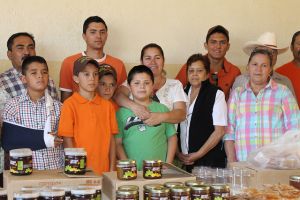 Edgardo González is proud of his pigs. He raises more than 200 a year outside the small city of Tepechitlán in the central Mexican state of Zacatecas. Like many Mexicans though, it has taken him a long time to realise his dream.
Edgardo González is proud of his pigs. He raises more than 200 a year outside the small city of Tepechitlán in the central Mexican state of Zacatecas. Like many Mexicans though, it has taken him a long time to realise his dream.
‘Like most of my family, I went to work in the United States. I lived in Corona, California. I earned seven hundred dollars a week working as a gardener, but I always wanted to come back home and run a pig farm.’
Almost one and a half million people from Zacatecas (half the state’s total population) currently live in the United States. Altogether, according to figures from Oxfam Mexico, some 12 million Mexicans are resident north of the border. More than half of them entered the United States without proper papers.
Each year, an estimated 400,000 of these Mexican migrants return to their own country. According to Efraín Jiménez Muñoz, who works with the Clubes Zacatecas del Sur de California: ‘four out of five Mexican migrant workers just want to go to the United States to work and save enough money so that they can go back to their community of origin.’
In California, Efraín and others have got together so that, as well as sending money back individually to families in Mexico, migrant workers can invest money collectively in projects back in Zacatecas.
‘As well as collecting funds to pay for things like roads, or schools and other improvements, we want to help create jobs back in Zacatecas so that a new generation of Mexicans does not have to make the journey we did.’
 Efraín and others helped set up FEDZAC in Zacatecas, to provide advice and training for small businesses run by returning migrants. They have benefitted from the Mexican government scheme 3×1 that offers three times as many dollars in government funding for every one raised by the workers.
Efraín and others helped set up FEDZAC in Zacatecas, to provide advice and training for small businesses run by returning migrants. They have benefitted from the Mexican government scheme 3×1 that offers three times as many dollars in government funding for every one raised by the workers.
Edgardo was one of the first to benefit from the scheme. Now he’s convinced his ‘Mexican dream’ is just as valuable as his experience in the United States: ‘I want to stay here in Mexico now, raise my family, and produce enough to employ others, sell the meat and help create jobs here.’
FEDZAC supports many small-scale projects of this kind, including a water-bottling plant, computer repair shops, and the production of mescal, honey and other preserves.
‘We have to find worthwhile employment for young people,’ Efraín says. ‘Often they fall into the hands of criminal organisations because they have to eat, to feed their families, to buy them nappies and so on. It’s only by providing well-paid honest work that we can break that cycle.’
Concern over new PRI government
He also sounds a note of caution about the incoming PRI government. He stresses that they must provide proper legal guarantees for the investments being made by migrants in the United States.
‘Peña Nieto says he’s a new generation, not like the old PRI. He talks fine, but what we don’t want to see is the old PRI with its clientelism, its paternalist attitudes. We don’t want to be dependent on the state, we want determined action so that alternatives can be created, and for the social fabric of Mexico to be repaired to stop so many Mexicans thinking the American dream is so much better than the Mexican one.’
 Project “Beekeepers of Nochistlán”. Under the label “Campos de Miel”, the project “Beekeepers of Nochistlán” make different products from honey in the municipality of Nochistlán. Apart from honey, they sell other products, like syrup with resin extracted from bees and creams. Twelve families take part in this activity.
Project “Beekeepers of Nochistlán”. Under the label “Campos de Miel”, the project “Beekeepers of Nochistlán” make different products from honey in the municipality of Nochistlán. Apart from honey, they sell other products, like syrup with resin extracted from bees and creams. Twelve families take part in this activity.
Project “Los Huertos”. Alejandra (27) and Elizeth (18) make coconut sweets called “Greñudas” in Los Huertos, in San Mateo, Valparaíso. Most young people do not have the chance to continue with their studies, so men, like Alejandra’s and Elizhet’s brothers, emigrate in search of work.Piglets of “La Granja Noxtli”. The piglets of “La Granja Noxtli” are the most sought after products at a regional level in the Pánuco municipality; the added value of these piglets is that they are fed with corn produced in the same farm.

